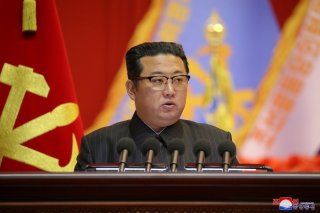New UN Report Details North Korea's Sanctions Violations
The UN found that North Korea continues to engage in criminal behavior, including hacking and cyber attacks.
The United Nations Security Council has issued a new report detailing sanctions violations by North Korea between August 2021 and January 2022.
“During the reporting period, the Democratic People’s Republic of Korea continued to maintain and develop its nuclear and ballistic missile programmes in violation of Security Council resolutions. Although no nuclear tests or launches of intercontinental ballistic missiles were reported, the Democratic People’s Republic of Korea continued to develop its capability for the production of nuclear fissile materials,” the report said.
The period in question concluded prior to North Korea’s intercontinental ballistic missile (ICBM) launch in late March, which led the United States to impose new sanctions against five North Korean entities. That launch ended North Korea’s five-year moratorium on ICBM tests.
“There was a marked acceleration of the testing and demonstration of new short- and possibly medium-range missiles incorporating both ballistic and guidance technologies and using both solid and liquid propellants, which continues as at the end of January 2022. New technologies tested included a possible hypersonic gliding warhead and a maneuverable re-entry vehicle,” the report continued.
In addition, North Korea demonstrated “increased capabilities” for rapid deployment of the weapons, and the regime’s nuclear and ballistic missile infrastructure has continued to be maintained.
The UN report also stated that North Korea’s “strict blockade” in response to the COVID-19 pandemic led to “historically low levels of goods and people entering and leaving the country; and licit and illicit trade, including in luxury goods, has largely ceased.”
But even that, per Yonhap News Agency, hasn’t stopped North Korea’s nuclear ambitions.
North Korea, the UN report said, also continues to engage in criminal behavior, including hacking and cyber attacks. “These activities constitute espionage intended to inform and assist the sanctions evasion strategies of the Democratic People’s Republic of Korea,” the UN said.
“Cyberactors target relevant entities to fraudulently solicit relevant information, including to sidestep the effects of sanctions, and also to generate money to fund the country’s operations. Other cyber campaign trends include using false personae in order to establish relationships and then send malware or malicious links. This can also lead to credential harvesting through phishing sites. In cases of successful deployment of ransomware to generate illicit revenue, this would constitute a violation of financial sanctions.”
Recommendations issued by the UN include sanctions on O Yong Ho, who is accused of procuring items for illicit programs. UN member states are also urged to “add to their ship circulars information pertaining to detected cases of vessel identity laundering or tampering, and ensure wide dissemination, including to maritime authorities.”
Stephen Silver, a technology writer for The National Interest, is a journalist, essayist and film critic, who is also a contributor to The Philadelphia Inquirer, Philly Voice, Philadelphia Weekly, the Jewish Telegraphic Agency, Living Life Fearless, Backstage magazine, Broad Street Review and Splice Today. The co-founder of the Philadelphia Film Critics Circle, Stephen lives in suburban Philadelphia with his wife and two sons. Follow him on Twitter at @StephenSilver.
Image: Reuters.

